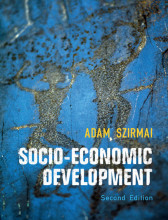State formation and political aspects of development
10 important questions on State formation and political aspects of development
Discuss the differences between the Marxist and the Weberian perspectives of the role of the state in socio-economic development.
- Government is own separate class with its own interests.
- Functioning of the state is primarily determined by the interests of dominant groups and classes in the economic sphere
- State is not a neutral institution.
Weber: : political power is not a reflection of economic power
- State becomes increasingly important during bureaucratisation.
- State formation is one of the requirements for economic development
Why does Max Weber interpret the emergence of bureaucracy as a positive factor in economic development?
- Greater effectiveness and predictability
Analyse the mutual interrelationships between economic growth and political stability or instability.
- Economic development is also required for political stability.
- Because without growth, standards of living will stagnate which leads to dissatisfaction
- Higher grades + faster learning
- Never study anything twice
- 100% sure, 100% understanding
Analyse the typical characteristics of state formation in developing countries.
- New states often contain many ethnic groups that don’t identify with national institutions.
- Language of colonial rulers was used as main language
- The legitimacy of the new state institutions is often weak
Internal political instability: national rulers can view expressions of ethnic, tribal, religious and cultural individuality as a threat to political unity, so these expressions are often suppressed -> conflict
External political interference as a destabilising factor: when there is internal political instability, external political interferences might occur.
What are the most important differences between processes of state formation in developing countries and earlier processes of state formation in Western Europe?
- Centralisation never led to the establishment of one European empire. Instead there were multiple states competing with each other
- European states were strong and effectively centralised
- The holders of money and market economy had an independent position.
Provide an analysis of the economic effects of corruption in developing countries.
-Corruption reduces the effectiveness of the government.
- The predictability of government behaviour declines.
-Corruption also includes rent-seeking behaviour and firms acquiring monopolistic profits through manipulation of political system.
To what extent is the post-Cold War international order more or less peaceful that the international order during the Cold War?
- Ethnic, cultural and religious tensions have increased.
- Not in all countries
- Conflicts have become more internal
The end of the Cold War has led to new opportunities for democratisation in Africa and Asia.
Why is the role of the state in economic development in present-day developing countries greater than the role of the state in the development of Western countries in the 18th and 19th century? To what extent is the increased importance of the state a stimulus for or an obstacle to economic development?
-Developing countries lagged behind regarding infrastructure, education and healthcare. In order to improve these fields, additional government efforts were needed.
-The policy goal of accelerated development in order to narrow the gap between rich and poor countries.
-Distrust with free market because capitalism and international trade were associated with colonialism and foreign oppression.
But too much government intervention -> economic stagnation, so now reduction of role of state in economics
What kind of relationships can be identified between democracy and economic development? To what extent is democratic rule compatible with rapid economic development.
Perspective 2: Democratisation is not the first priority of developing countries
Perspective 3: democratisation, civilian freedoms and economic growth reinforce each other.
- Sustained growth only possible in inclusive democratic societies
- Authoritarian regimes can achieve rapid growth, but only in short term.
Absence of democratic checks, balances and controls leads to authoritarian regimes continuing with their ineffective or harmful economic policies.
Under what conditions can economic growth result in increasing instability?
- This leads to political tensions and conflict.
The question on the page originate from the summary of the following study material:
- A unique study and practice tool
- Never study anything twice again
- Get the grades you hope for
- 100% sure, 100% understanding
































